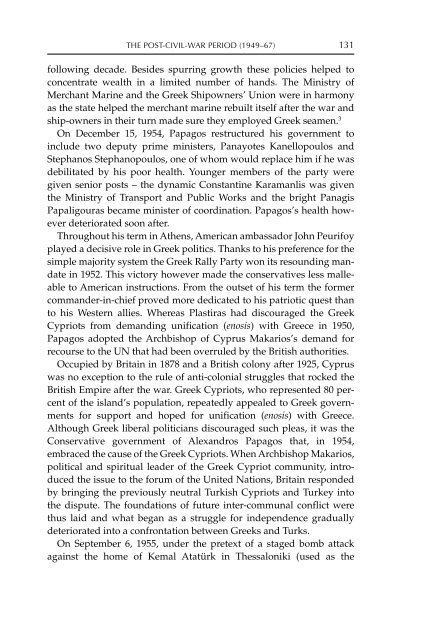MODERN GREECE: A History since 1821 - Amazon Web Services
MODERN GREECE: A History since 1821 - Amazon Web Services
MODERN GREECE: A History since 1821 - Amazon Web Services
Create successful ePaper yourself
Turn your PDF publications into a flip-book with our unique Google optimized e-Paper software.
THE POST-CIVIL-WAR PERIOD (1949–67) 131<br />
following decade. Besides spurring growth these policies helped to<br />
concentrate wealth in a limited number of hands. The Ministry of<br />
Merchant Marine and the Greek Shipowners’ Union were in harmony<br />
as the state helped the merchant marine rebuilt itself after the war and<br />
ship-owners in their turn made sure they employed Greek seamen. 3<br />
On December 15, 1954, Papagos restructured his government to<br />
include two deputy prime ministers, Panayotes Kanellopoulos and<br />
Stephanos Stephanopoulos, one of whom would replace him if he was<br />
debilitated by his poor health. Younger members of the party were<br />
given senior posts – the dynamic Constantine Karamanlis was given<br />
the Ministry of Transport and Public Works and the bright Panagis<br />
Papaligouras became minister of coordination. Papagos’s health however<br />
deteriorated soon after.<br />
Throughout his term in Athens, American ambassador John Peurifoy<br />
played a decisive role in Greek politics. Thanks to his preference for the<br />
simple majority system the Greek Rally Party won its resounding mandate<br />
in 1952. This victory however made the conservatives less malleable<br />
to American instructions. From the outset of his term the former<br />
commander-in-chief proved more dedicated to his patriotic quest than<br />
to his Western allies. Whereas Plastiras had discouraged the Greek<br />
Cypriots from demanding unification (enosis) with Greece in 1950,<br />
Papagos adopted the Archbishop of Cyprus Makarios’s demand for<br />
recourse to the UN that had been overruled by the British authorities.<br />
Occupied by Britain in 1878 and a British colony after 1925, Cyprus<br />
was no exception to the rule of anti-colonial struggles that rocked the<br />
British Empire after the war. Greek Cypriots, who represented 80 percent<br />
of the island’s population, repeatedly appealed to Greek governments<br />
for support and hoped for unification (enosis) with Greece.<br />
Although Greek liberal politicians discouraged such pleas, it was the<br />
Conservative government of Alexandros Papagos that, in 1954,<br />
embraced the cause of the Greek Cypriots. When Archbishop Makarios,<br />
political and spiritual leader of the Greek Cypriot community, introduced<br />
the issue to the forum of the United Nations, Britain responded<br />
by bringing the previously neutral Turkish Cypriots and Turkey into<br />
the dispute. The foundations of future inter-communal conflict were<br />
thus laid and what began as a struggle for independence gradually<br />
deteriorated into a confrontation between Greeks and Turks.<br />
On September 6, 1955, under the pretext of a staged bomb attack<br />
against the home of Kemal Atatürk in Thessaloniki (used as the


